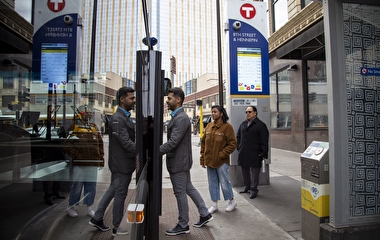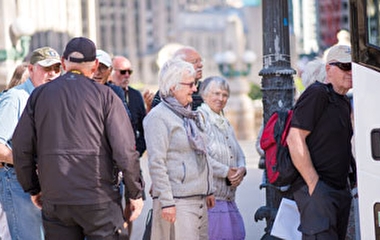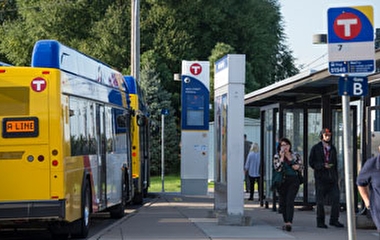All rights reserved.
The City of Ramsey is a rapidly growing exurb of Minneapolis, and its main thoroughfare, Highway 10, is experiencing chronic congestion as a result. The Highway 10 corridor is slated for significant upgrades in the next 20 years to convert it to a limited-access highway. As part of the U of M’s Resilient Communities Project (RCP), a team of graduate students developed ideas for a more substantial process of communication between city staff and those most affected by current conditions along the corridor and future improvements.
The city was RCP’s community partner for the 2017–2018 school year. RCP, housed within the Center for Urban and Regional Affairs, seeks to connect students’ innovation, ingenuity, and fresh perspectives with local government agencies to learn about their needs, conduct research, and develop solutions, says RCP director Mike Greco.
Through RCP, students in a fall-semester course offered by the Humphrey School of Public Affairs (PA 5253: Planning and Participation Processes) identified strategies to productively engage with the main groups of stakeholders concerned about the future of Highway 10: business owners, residents, and commuters.
The instructor for the course was Dan Milz, a visiting assistant professor of environmental planning and civic engagement. The student team consisted of Ashley Hartle, T.J. Hofer, Joe Polacek, Alyssa Schmeling, Alicia Valenti, and Michael Wade. Their project report—The Road to Prosperity: Engaging Ramsey for a Better Highway 10—was prepared in collaboration with Tim Gladhill, community development director for the City of Ramsey.
The team recommended that to engage all stakeholder groups effectively, each group should have its own engagement strategies. Example strategies include a business-owner advisory committee, surveys to residents and commuters, and an interactive mapping event for residents.
A second report related to the Highway 10 project was completed in a capstone course at the Humphrey School this spring, also taught by Milz. This group picked up the work from fall semester and conducted a charette-style workshop with community stakeholders. One of the students from the fall semester course, T.J. Hofer, was a member of the capstone team, along with Myles Campbell and Natela Jordan.
The Highway 10 corridor study was one of 21 projects that were part of this year’s RCP partnership with Ramsey. More than 50 student teams from 16 academic departments participated.
The collaboration provided the city and its residents with case studies, data analysis, concept plans, designs, and policy recommendations to build resilience in Ramsey, Greco says. It also offered more than 275 students the opportunity to tackle real projects as part of their coursework, working directly with Ramsey city staff, residents, and business owners.
At an end-of-year event, Ramsey’s acting mayor, John LeTourneau, thanked RCP for partnering with the city, promising that “The data and the information that the students and everyone else have brought forward is going to be applied in many different ways” as Ramsey strives to remain resilient in the face of rapid growth.



